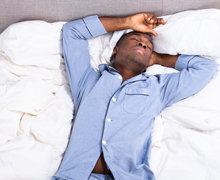
It's no secret that a good night's sleep helps people feel better when they are sick. Scientists believe they now we know why as new research from Ludwig Maximilian University of Munich in Germany shows what happens to the immune system when someone gets good sleep.
Sleep scientist Dr. Luciana Besedovsky and colleagues were looking to better understand the biological reason previous research revealed those who slept after receiving a vaccination had double the immune response of those who did not get any sleep after the injection. So they conducted experiments and published their findings in the journal Brain, Behavior and Immunity.
What they found is the immune cells, called T cells, migrated toward lymph nodes during sleep. Researchers said that is what was responsible for the more robust immune response.
The study involved scientists examining the concentration of subgroups of T cells in the blood of healthy men and women who were monitored over the course of two 24-hour sessions. One session involved the participants getting a full eight hours of sleep during the night. The other session had the people relaxing in bed but staying awake all night.
Scientists inserted a catheter into the forearm of the participants so they could monitor their blood remotely without disturbing their sleep.
"Our results show that sleep promotes the migratory potential of various T-cell subpopulations," Besedovsky said.
It was discovered that sleep increased the migration of T cells toward a signaling protein, known as the "homing" chemokine CCL19. This molecule helps direct the T cells toward the lymph nodes where they are "trained" in a way that makes them suitable for the task at hand, such as being presented with antigens after a vaccination.
Scientists were able to show that incubating T cells with blood plasma from sleeping participants also increased the migratory potential of the T cells.
"This demonstrates that soluble factors that are elevated in blood plasma during sleep mediate the effect of sleep on T-cell migration," Besedovsky said. "So we can in a way recreate the effect of sleep in the lab using the blood plasma of sleeping persons."
The migration behavior was also aided by a growth hormone and the hormone prolactin. Both were found in higher levels in the blood of those who slept well.
"Our results also have potential clinical implications," said Besedovsky. "Thus, growth hormone and prolactin could be considered as new adjuvants to promote immune responses following vaccination, especially in aged people, who typically display reduced levels of these hormones during sleep."
Click here to read more in the journal Brain, Behavior, and Immunity.
